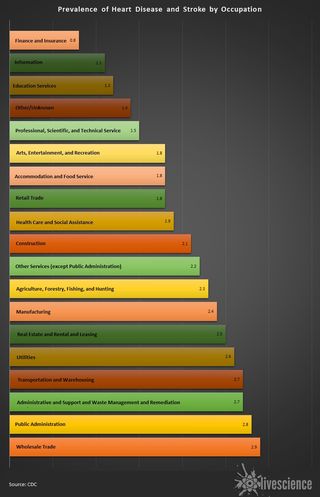Jobs with Highest and Lowest Heart Disease Risk Revealed

People's risk of heart disease may differ based on their jobs — workers in service and blue-collar occupations, as well as unemployed people, are at increased risk for heart disease and stroke, according to a new report.
Researchers found that people's risk of heart disease and stroke varies with their industry. Those working in wholesale came in at top of the list, as 2.9 percent of the people in that industry had suffered heart disease or a stroke.
Those working in finance and insurance had the lowest rate of heart disease, at 0.8 percent. [See heart disease rates in each industry]

For the study, researchers at the Centers for Disease Control and Prevention looked at national health surveys conducted between 2008 and 2012 to estimate the rate of heart disease and stroke among adults younger than 55. The researchers also analyzed whether unemployed people or workers in certain industries had different risks compared with their peers.
Among employed people, workers in service and blue-collar occupations were more likely than those in white-collar occupations to report having had heart disease or a stroke.
However, heart disease risk also depends on people's age and gender. When the researchers adjusted their results based on those factors, they found the rate of heart disease and stroke was highest among people in two industries: One is called Administrative and Support and Waste Management and Remediation Services, and it includes people working in business support services and security services, as well as landscape services and waste management. The other category is called Accommodation and Food Service, which includes people who work in traveler accommodations, restaurants and bars.
Looking at employment status, the researchers found that 1.9 percent of employed people had experienced heart disease or stroke, compared with 2.5 percent of unemployed people who were looking for work, and 6.3 percent of people not in the labor force. That group includes unemployed adults who have stopped looking for work, homemakers, students, retired people and people with disabilities.
Sign up for the Live Science daily newsletter now
Get the world’s most fascinating discoveries delivered straight to your inbox.
Cardiovascular diseases account for one in three deaths every year in the United States. Most of these deaths are caused by stroke or the most common type of heart disease, called coronary artery disease, which is a narrowing of the blood vessels. That condition can progress and lead to a heart attack.
Risk factors for heart disease range from having medical conditions such as diabetes and high blood pressure, to lifestyle factors such as diet, smoking and physical activity. Work-related risk factors for heart disease and stroke include noise, job stress, secondhand smoke and doing shift work, according to the CDC.
To address work-related factors contributing to heart disease risk, the CDC launched a program called the Total Worker Health in 2011. It aims to control occupational risk factors, such as job stress, while promoting a healthy lifestyle.
People who have jobs in industries with higher rates of heart disease might especially benefit from an employer-sponsored Total Worker Health program, the researchers said.
It's not clear why people's jobs are linked to their heart disease risk, but certain characteristics of jobs may come into play. For example, workers employed in Administrative and Support and Waste Management and Remediation Services have reported higher rates of job insecurity than all other workers, the researchers said. Job insecurity is a common cause of stress.
Another factor may be working alternative shifts, which is more common among those employed in Accommodation and Food Services, the researchers said. The report was released today (July 31).
Email Bahar Gholipour. Follow Live Science @livescience, Facebook & Google+. Originally published on Live Science.













